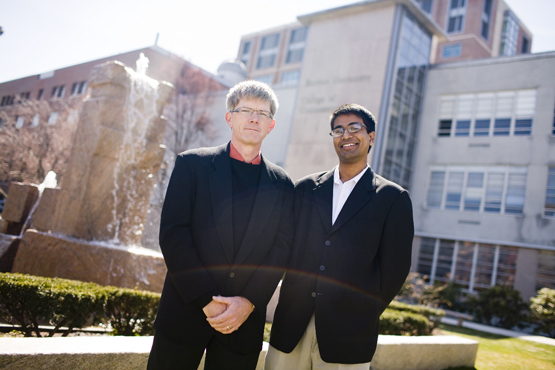A Modern Version of the Fourth Estate
COM student wins grant to plan a media company in India

More than 30 million people in India can afford only one meal a day; of India’s more than one billion people, 750 million living in rural areas don’t have access to health care or education.
Wanting to take action, graduate student Sid Selvaraj (COM’10) and two friends created the Fourth Estate, a nonprofit media organization designed to educate and inspire people to find solutions to India’s greatest problems. And the people they want to reach are not here in the United States — they’re in India, among the growing middle class.
The group recently won the College of Communication’s Harold G. Buchbinder Entrepreneurial Media Studies Competition, which comes with a $10,000 prize. Sponsored and funded by Brian Cohen (COM’78), the competition offers full-time COM graduate students the chance to create, research, and develop a business plan supporting innovative products and services in the media field.
The award also pairs Selvaraj with Jay Roewe (COM’79), senior vice president of production for HBO Films and a member of the BU Board of Overseers, who is advising the Fourth Estate’s founders on how to launch their venture.
Selvaraj and friends Avinash Timothy and Joe Cyriac concocted the idea for the organization in high school in India, after they started an independent theater company. “We were interested in the way media can influence public opinion and convert opinion into action,” Selvaraj says. “With the Fourth Estate, we want to help bring exposure to challenging issues and create debate in our society.”
They chose the organization’s name from a famous phrase coined by 18th-century philosopher and member of Parliament Edmund Burke. At the time the three estates were the church, the nobility, and commoners. Burke, looking up at the press observing the House of Commons, pronounced, “Yonder sits the Fourth Estate, and they are more important than them all.”
To enter the competition, Selvaraj and his partners created a 14-month plan identifying key action items: market research in Bangalore, India, revenue and funding tactics, a thorough timeline, and plans for staffing.
The Fourth Estate’s media packages will be designed for seven forms of distribution — film and television, radio, theater, publishing, advertising, public relations, and animation. These departments will work on in-house productions as well as contract with third parties such as governmental agencies or nonprofits.
The organization’s first venture is the “AIDS Sutra” campaign. The film department, says Selvaraj, will create a documentary about someone with the HIV/AIDS virus. The radio department could create four podcasts to discuss concrete solutions to the AIDS epidemic. The animation department would create a short piece about an HIV-positive 10-year-old girl. The point, says Selvaraj, is to reach people in rural India, who do not have enough information about AIDS.
The group’s preliminary work will culminate in a media festival, slated for January 2011. The plan is to gather talent from across Bangalore to create buzz about the Fourth Estate.
Roewe, who lives in Los Angeles, came to campus a few weeks ago to meet with Selvaraj for the first time. When Roewe asked him to explain his project, Selvaraj says with a laugh, “I went on a long diatribe. He taught me that especially when you’re approaching corporate sponsors, you need to boil it down to a short paragraph, because then you’ll get them to pay attention.” The two now communicate every few weeks.
“What I’m trying to help the Fourth Estate do is balance the theoretical aspect with the practicality so that the real substantive goals are achieved,” Roewe says. “Sid is clearly in the realm of entrepreneurship in what he’s trying to put together, which is intriguing. And there’s the relevancy of a media type of venture in this day and age. I feel that I might even learn some things with the project.”
Selvaraj can be found on Skype around midnight most Saturday nights, talking to his partners in India. It may not be most students’ idea of a great Saturday night, but the three use the time to discuss the project’s grand vision. “Our roots will be set in Bangalore, and then hopefully we’ll form similar cells in India’s major metro areas,” Selvaraj explains. “If all goes well, we hope to repeat the structure in developing countries around the world.”
Amy Laskowski can be reached at amlaskow@bu.edu.

Comments & Discussion
Boston University moderates comments to facilitate an informed, substantive, civil conversation. Abusive, profane, self-promotional, misleading, incoherent or off-topic comments will be rejected. Moderators are staffed during regular business hours (EST) and can only accept comments written in English. Statistics or facts must include a citation or a link to the citation.